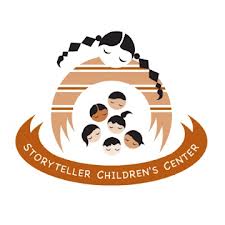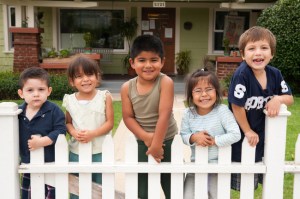Share This
Related Posts
Tags
Storyteller
By Erica Rascón on Mar 25, 2014 in Giving, People
Storyteller Children’s Center provides preschool education and support services for at-risk children and their families. 
The organization began in 1988 as a half-day preschool out of Transition House, with a parking lot for a playground. Over 25 years later it is a thriving organization with two locations, a dedicated staff, and a constant waitlist for student enrollment.
“We’ve never not had a waitlist,” says Joya Thomas, Development Associate at Storyteller. “Even after opening our second site in 2007 we still have about 80 families on the list at any given time. This shows that the need is really great.”
The need is great, indeed. 2013 census data by the American Community Survey reveals that the poverty rate in Santa Barbara County rested at 16.3 percent in 2012, higher than the national overage of 15 percent. According to the Santa Barbara View, there are nearly 1,500 homeless individuals living in the area. Many Storyteller students come from such families that struggle with housing, food security, and access to other basic necessities.
Challenging home conditions have an adverse affect on children’s development, often creating lasting obstacles in their path to academic success. “If a child has experienced trauma, like most children at Storyteller have, there are behavioral and emotional effects of this that affect their ability to focus or follow instructions. If a child has never had the opportunity to develop cooperative relationships or skill-building activities in a classroom setting before they enter kindergarten, it’s unlikely that they’ll do well or develop a confident view of their abilities,” Joya explains. “That negative self-image and accompanying academic failure often build on one another throughout grade school and is one of the factors that leads to dropping out of high school, which is the trajectory that these children are on, statistically.”
Storyteller aims to strengthen each child’s physical, social, emotional, cognitive, creative and linguistic development to the level needed for success in kindergarten and beyond. Joya says, “We hope that they learn to self-regulate, recognize and identify emotions; that they use their words instead of hitting, for example. These are really basic things that will give them a chance to succeed in kindergarten.”
 Storyteller takes a holistic approach to addressing students’ needs. Every child enrolled first undergoes an evaluation by a professional with Storyteller collaborator Child Abuse Listening and Meditation (CALM). The CALM therapist determines the physical and social-emotional health needs of the child. A plan is then made for each child which involves therapists, teachers, and parents all working together to support the unique needs of the child in the best way possible. The team’s strategy is evaluated and adjusted throughout the year based on the child’s progress and any additional concerns that may arise. “Open communication between teachers and parents, parents and therapists, is vital to the child’s success,” says Joya.
Storyteller takes a holistic approach to addressing students’ needs. Every child enrolled first undergoes an evaluation by a professional with Storyteller collaborator Child Abuse Listening and Meditation (CALM). The CALM therapist determines the physical and social-emotional health needs of the child. A plan is then made for each child which involves therapists, teachers, and parents all working together to support the unique needs of the child in the best way possible. The team’s strategy is evaluated and adjusted throughout the year based on the child’s progress and any additional concerns that may arise. “Open communication between teachers and parents, parents and therapists, is vital to the child’s success,” says Joya.
These important relationships between teachers, parents, and therapists are supported through Reflective Practice, a meeting lead by Storyteller’s on-sight CALM therapist to give teachers the opportunity to gain support and insights from others while learning the tools necessary to support each child’s unique needs.
The strategy has proven successful. In 2008 Storyteller began a longitudinal study with UCSB’s Gevirtz Graduate School of Education to track Storyteller graduates through third grade. They now have data for four cohorts in the school system, all of which have done well in kindergarten.
Mike Furlong, Chair of the Department of Counseling, Clinical, & School Psychology at UCSB, who heads up the study says, “If every child entering Santa Barbara schools responded as positively to instruction as the Storyteller children, then we would make huge strides toward closing the achievement gap.” Seeing the success of Storyteller’s program, other Santa Barbara organizations and two schools within the Santa Barbara Unified School District have adopted Reflective Practice methodology.
Community involvement is key to Storyteller’s continued success. Yardi’s contributions helped Storyteller serve close to 30,000 warm, healthy meals to Storyteller children and provide 1,882 hours of intervention services to families in need last year. Supporters of all means can donate supplies found on Storyteller’s wish list , sponsor a child, or simply volunteer with the children.
